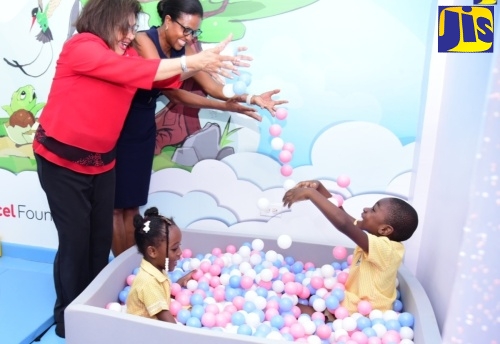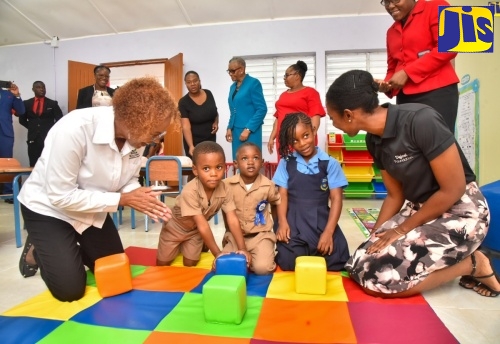ECC Establishes Inclusive Classrooms under Legacy Project
By: , March 14, 2024The Full Story
Four inclusive classrooms have been established under phase one of the Early Childhood Development Legacy Project.
Being implemented by the Early Childhood Commission (ECC), the project aims to modify and equip classrooms in infant departments to provide holistic spaces where children with disabilities can learn along with their peers who do not have special needs.
The objective is to create equitable and nurturing learning environments for children.
The four classrooms that have been retrofitted are located at Jamaica/China Goodwill Infant School in Morant Bay, St. Thomas; Jamaica/China Goodwill Infant on Olympic Way, Kingston; Hoolebury Primary Infant, St. Ann; and Bethabara Infant School in Manchester.
Modifications of the classrooms were done with support from Digicel Foundation, Culture Health Arts Science and Education (CHASE) Fund and United Way of Jamaica.

The legacy project was implemented in 2022 when Governor-General, His Excellency, the Most Hon. Sir Patrick Allen declared 2022 as the ‘Year of Early Childhood Development’, to mark Jamaica’s 60th Year of Independence.
Director for Cross-Sectoral Coordination and Partnership at the ECC, Michelle Campbell, in highlighting the importance of the undertaking, notes that children with special needs are often educated in separate schools or institutions from their peers.
“At the early-childhood level, it is very important to ensure that our children are developing and growing together, learning to accept each other, developing their confidence and learning how to work together with everyone,” she explains.
In an inclusive classroom, the focus of education is on the child’s abilities, not disabilities.
The benefits are that children become more understanding and accepting of the differences, talents, personalities and needs of others, and important relationships and friendships develop as students engage with their peers.
They also gain from being taught by highly trained teachers, who are skilled at delivering a curriculum that is appropriate to the needs and ability of each student.

While the inclusive classroom enables children to learn together in the same age-appropriate space, the ECC Director tells JIS News that students go through different stages of assessment and are provided with individual learning support plans to meet his/her particular learning style or need.
“These plans indicate to the teachers what the students should be learning based on their abilities and where we want to get them to,” she points out. The legacy project is in keeping with the ECC’s National Strategic Plan, which focuses on a holistic approach to learning.
“We look at parenting, health, screening and early intervention, the institutions, teacher training and the curriculum are the areas given priority focus,” Ms. Campbell says.
He commends the Government for providing support to the Commission to secure a suite of assessment tools for screening and early intervention for students with special needs.
These include the Jamaica School Readiness Assessment, which targets four-year-old students.
They are assessed to determine their numeracy, literacy, behaviour and health levels, and the information obtained is used by teachers to determine whether further intervention is required or if the child should be placed in a typical classroom.
If concerns/issues are detected during the primary assessment, a secondary assessment called the Ages and Stages Questionnaire is administered.
This type of assessment is designed specifically for Jamaica, in line with the local culture, and at this point the parents/guardians are included.
In 2022, the ECC assessed over 27,000 children, and the report shows that close to 7,000 needed the secondary assessment.
Mrs. Campbell points out that assessments are extended to the families to see if there is a need.
She explains that if the child is in need, it is likely the family will also have a particular need, and the objective is that the ECC not only supports the children but also their families.
“When it comes to children with special needs it is always sensitive. The ECC is very mindful of that, so we make sure that the best service is provided at all times”, Mrs. Campbell says.
Phase two of the Legacy Project will commence this year.
The ECC is appealing to individuals and corporate Jamaica to support the early childhood sector as the Commission continues to work to make Jamaica the place of choice to live, work, raise families and do business.
To contact the ECC persons may call 872-922-9296 or send email to registration@ecc.gov.jm or mcampbell@ecc.gov.jm.




